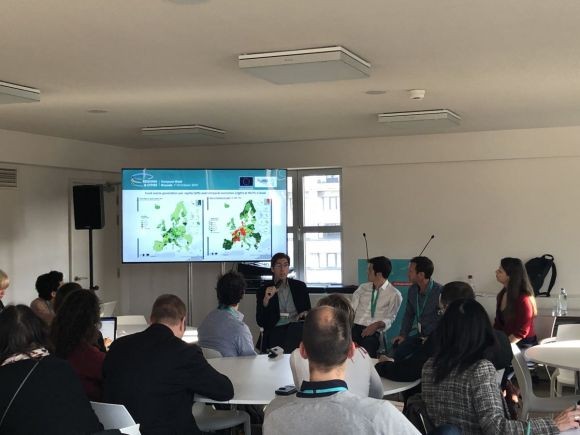
Globally, about ⅓ of food produced is wasted each year (FAO) while every day, 821 million people across the globe suffer from hunger (UN, 2017 Report). In Europe, only about 173 kg of food per inhabitant is wasted every year. How can the EU act towards reducing food waste ? How local and regional authorities can turn food waste from public institutions, businesses, and households into a resource for the whole society? These were the questions that were addressed by the representatives of ESPON, INTERACT, Interreg Europe and URBACT programmes during the “Fighting food waste while boosting local economic activity” session, on the last day of European Regions Week.
Food waste is one of the biggest issues of the 21st-century world even though it is still in the shadow of the global environmental discourse. To better understand its enormous impact, it is important to note that every year, about 3,3 gigatons of CO2 emissions are caused by food waste, and it is the 3rd worldwide polluter after the USA and China (FAO, 2013).
“What we think about when we throw away food?” : this was the question Marcelline Bonneau, URBACT Programme expert from Belgium, addressed the audience during the opening remarks of the session. About 79 million European citizens live below the poverty threshold while according to Bonneau, food waste is becoming a bigger issue in Europe. In a 2012 assessment, the European Parliament estimated that by 2020, the food waste will be increased by 40%.
Food waste is an international issue and it’s embedded in many layers of daily life. The panel discussion focused on various aspects of food waste such as food waste measurement in Europe, successful case studies towards reducing food waste in several EU regions, as well as food waste and economic activities.
Key tools : the public procurement
The first speaker, Carlos Tapia Garcia, a Senior Researcher from the Energy and Environment Division TECNALIA, Spain, talked about the food waste measurement in Europe. He noted that statistics about food waste are neutral because those are collected differently. It is very difficult to have exact measurements for the EU countries.
Thibaud Lalanne, a Project Coordinator from the Municipality of Mouans-Sartoux (France) presented the successful actions towards food waste reduction in the city of Mouans-Sartoux. Lalanne noted that one of the key tools to achieve success and fight wood waste is public procurement. The project entitled BioCanteens aims to distribute sustainable school meals, and it not only addresses the food waste issue, but also tackles food policies towards the protection of the environment and citizens’ health. Thanks to the project, there was a dramatic food waste reduction in the city of Mouans-Sartoux. The speaker said that the actions included simple actions such as monitoring of habits or small portions of food to children. From 147kg per capita in 2010, the food waste was reduced to 32kg per capita in 2015 saving about 0,2 euros per meal.
The third speaker, Samuel Féret, a project manager at the Institut Agronomique Méditerranéen de Montpellier (France), talked about the ECO WASTE 4 FOOD project that aims to address the issue of food waste. He said that it promotes a better resource-efficient economy among local and regional authorities throughout Europe. According to Féret, they promote new business models in the food supply chain that helps to combat food waste. One of the examples of a successful implementation of their initiative is the Wielkopolska Region in Poland, where special vouchers are given to those organizations that suggest innovative solutions in limiting food waste. Feret stressed that regional and municipal strategies are crucial while taking actions towards reducing food waste.
The "Good Food Strategy"
At the end of the panel discussion, Marcelline Bonneau presented the Good Food Strategy. Towards a sustainable food system in the Brussels initiative, that is led by the Bruxelles Environment. The project aims to combat food waste and recycle unsold food and organic waste according to the circular economy processes. The mission of the project is to reduce food waste by 30% by 2020. According to Bonneau, the project gives an online tool for citizens to identify and measure food waste. The citizens are also given solutions which help them to design their programs to reduce food waste. The other initiative by Good Food Strategy aims to create a guide for all types of organizations that collect food : citizens, NGOs and startups. It ensures that they are doing it in a sanitary way.
The session also included round table discussions where the speakers shared their experiences with the participants and discussed the possibilities of food waste reduction and economy boost across EU regions. Even though the issue of food waste needs to be addressed more, the various successful projects initiated in the EU and its regions shows that there are possibilities to locally and regionally tackle the issue and find innovative solutions for a Greener Europe.
Arpine Haroyan (Armenia)



